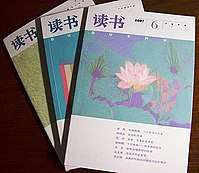Dushu
Dushu (Chinese: 读书; pinyin: Dúshū, Reading in Chinese) is a monthly Chinese literary magazine which has great influence on Chinese intellectuals.[1] It is based in Beijing.
 | |
| Discipline | Literature, Philosophy |
|---|---|
| Language | English |
| Publication details | |
| History | 1979-present |
| Publisher | Sanlian Press (China) |
| Frequency | Monthly |
| Standard abbreviations | |
| ISO 4 | Dushu |
| Indexing | |
| OCLC no. | 591903297 |
History
The journal was first published in April 1979 with its lead article entitled "No Forbidden Zone in Reading." The first editor came from the Commercial Press in Beijing, before moving into the hands of Fan Yong of Sanlian Press the next year. Sanlian was also the press which published the periodical. Articles introduced many ideas from modern Western philosophy (e.g. Nietzsche, Heidegger, Cassirer, Marcuse, Sartre, and Freud) as well as post-colonial theories such as Orientalism. Circulation rose from 50,000 to 80,000 in the first five or six years.[2] However, during these early years until as late as 1988, there was much secrecy around who edited Dushu aside from it being established by a number of "publishers."[3]
In 1996, Wang Hui and Huang Ping became executive editors. The magazine has tended to raise issues not previously discussed and carries a wide range of political opinions, including the views of Chinese liberals, the Chinese New Left,[4] and generally anti-neoliberal views.[5] In 2007, the CCP propaganda department ordered the publisher to dismiss Wang and Huang, a decision that weakened the New Left in China.[5]
References
- Callahan, William A. (2013). China Dreams: 20 Visions of the Future. New York: Oxford University Press. p. 92. ISBN 978-0-19-989640-0.
- Wang Hui (November 2000). "Fire at the Castle Gate". New Left Review. 6.
- Masson, Michel (2000). "Guest Editor's Introduction". Contemporary Chinese Thought. 31 (4): 3–7. doi:10.2753/CSP1097-146731043. ISSN 1097-1467.
- Zhang Yongle (February 2008). "Dushu and the Chinese Intelligentsia". New Left Review. 49. Retrieved 30 May 2015.
- Chris Bramall (2008): Reversing the Verdict on Maoism? Journal of Communist Studies and Transition Politics 24:4, pp. 657-667 (review of The Battle for China’s Past by Gao Mobo and Mao: The Unknown Story by Chang Jung and Jon Halliday), here p. 657.